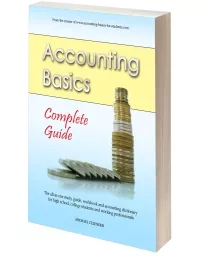Journal Entry for Income
(Cash Example)
Previous lesson: Journal Entry for Drawings
Next lesson: Accrued Income Journal Entry
In this lesson we're going to go through our previous example for our sample business, George's Catering, and work out the full journal entry for income when it is received immediately in cash.
Check your understanding of this journal entry and lesson by taking the quiz in the Test Yourself! section further below. And right at the bottom of the page, you can find more questions on the topic submitted by fellow students.
Cash Income Journal Entry Example
e) Now George’s Catering provides catering services for a wedding. George gets $10,500 from this job in cash.

As usual, we're first going to look at which accounts would be affected in this transaction and the impact on our accounting equation. Then after that we'll work out the double entry.
Here's how our basic accounting equation would be affected:


The easiest part of this transaction to figure out is that cash (or our bank account) has been affected.
Cash or bank has increased.
Cash or bank is an asset. Assets increase on the debit side of our equation (left) and decrease on the credit side (right).
So this means that we debit our bank account.
Now, what is the credit entry? Or to put it another way, what is the source of this increase in cash?
The answer is the income. George's Catering has made income, and this is worth $10,500.
Remember, more income (1) means more profit, which means more for the owner (2). Income thus comes into being (and increases) on the same side as the owner’s equity – namely the right side (credit).
The full journal entry for income received immediately in cash is:

Remember, in accounting we don't just list "income" as the account, instead we list the exact type of income that took place, which in this case is "services rendered."
Another important note: remember that income is not the assets (i.e. cash) you get from, for example, rendering services. It is the event itself (the rendering of the service) that results in cash coming in (immediately or at a later stage).
The cash is the asset part of the transaction. Income is the event that takes place that results in more assets being owned by the owner.
Test Yourself!
Before you start, I would recommend to time yourself to make sure that you not only get the questions right but are completing them at the right speed.
Difficulty Rating:
Beginner
Quiz length:
3 questions
Time limit:
4 minutes
Important: The solution sheet on the following page only shows the solutions and not whether you got each of the questions right or wrong. So before you start, get yourself a piece of paper and a pen to write down your answers. Once you're done with the quiz and writing down your answers, click the Check Your Answers button at the bottom and you'll be taken to our page of solutions.
Good luck!
If you are having any difficulty understanding this example of income, return to our earlier lesson called Define Income where we go over in detail what income is and how it fits in with the accounting equation.
Or if you're generally struggling to do debits and credit journal entries, return to our popular lesson, Debits and Credits: what they really mean.
If you're feeling good about double entries, feel free to move on to our next lesson, where we'll go over an example of income where we don't receive the cash straight away (i.e. a credit transaction). Click here for our accrued income journal entry tutorial.
Stay up to date with ABfS!
Follow us on Facebook:
Return from Journal Entry for Income (Cash Example) to Double Entry Accounting
Return to the Home Page
Previous lesson: Journal Entry for Drawings
Next lesson: Accrued Income Journal Entry
Questions Relating to This Lesson
Click below to see questions and exercises on this same topic from other visitors to this page... (if there is no published solution to the question/exercise, then try and solve it yourself)
Journal Entry Question - Rent in Advance
Q: LaBouche Corporation owns a warehouse. On November 1, it rented storage space to a lessee (tenant) for 3 months for a total cash payment of $600 received …
Unearned Revenue
Q: Is unearned revenue a current liability?
A: In short, yes, it is a current liability. A full explanation follows...
You see, revenue or income …
© Copyright 2009-2023 Michael Celender. All Rights Reserved.
Click here for Privacy Policy.





Comments
Have your say about what you just read! Leave me a comment in the box below.